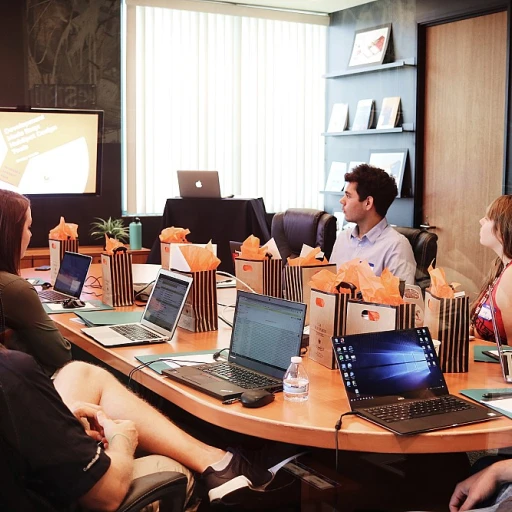
Understanding Employee Competencies
Decoding the Essence of Employee Competencies
In today's dynamic workforce, understanding employee competencies is crucial for both employers and employees. Competencies encompass a range of skills, knowledge, and abilities that are essential for job performance. They serve as a foundation for effective hiring and employee development, enabling organizations to align their workforce with strategic goals.
Competencies are not just about technical skills. They also include soft skills such as communication, problem solving, and critical thinking. These skills are increasingly important in a labor market where adaptability and innovation are key. As organizations strive for high-quality talent development, a competency-based approach becomes vital.
The Shift Towards Competency-Based Hiring
Employers are moving away from traditional degree requirements and embracing competency-based hiring. This shift allows organizations to focus on the actual skills and abilities of candidates, rather than relying solely on educational credentials. By identifying core competencies required for specific roles, organizations can ensure that they are hiring the right talent to meet their needs.
Moreover, competency frameworks provide a structured way to assess and develop employee skills. These frameworks help organizations identify skill gaps and create targeted training programs, fostering long-term career development for employees.
Competencies as a Driver for Organizational Success
For organizations, focusing on employee competencies is not just about individual growth; it's about achieving organizational success. By developing a competency-based workforce, organizations can enhance productivity, improve decision making, and achieve their strategic objectives. This approach ensures that team members are equipped to handle complex challenges and contribute to organizational growth.
In the following sections, we will explore the business case for focusing on competencies, the role of professional mentoring in developing these skills, and the challenges organizations face in implementing competency development programs.
The Business Case for Focusing on Competencies
The Imperative Need to Shift Focus
In the constantly evolving labor market, organizations must adapt swiftly to ensure they remain competitive. This necessity has led to a noticeable shift towards emphasizing employee competencies over traditional degree requirements. Employers today are recognizing that skills based competencies such as critical thinking, problem solving, and communication are pivotal to achieving organizational success.Aligning Organizational Goals with Competencies
Organizations are increasingly adopting a competency based approach to hiring, development, and workforce management. By focusing on high quality employee competencies, businesses can ensure that their teams possess the necessary soft skills to meet evolving organizational goals. This approach allows employers to tailor job roles and career development paths, fostering both individual and organizational growth.Key to Long Term Success
Developing a competent workforce isn't just about immediate job performance; it's about investing in the long term success of both the employees and the organization. Competency frameworks are instrumental in this pursuit, establishing a clear path for employees to enhance their skills and progress in their careers. This not only benefits current team members but also attract top notch candidates who are eager to contribute effectively from day one.Unlocking Opportunities Through Learning
To stay ahead in the dynamic business landscape, organizations are encouraged to offer free courses on professional organization and development. Such initiatives can unlock numerous opportunities for workers, aligning their competencies with the ever-changing demands of their roles. This skills based approach enables employers to build a versatile and resilient workforce, capable of navigating any challenges that may arise. By adopting a competency based strategy, organizations can create a thriving environment where both employees and the business prosper. For insights into unlocking growth opportunities within your team, consider exploring resources such as the article on Unlocking Opportunities with Free Courses on Professional Organization.Role of Professional Mentoring in Developing Competencies
Mentoring: A Catalyst for Enhancing Competencies
Professional mentoring has long played a pivotal role in the enhancement of employee competencies. As modern organizations strive to thrive in an ever-evolving workforce landscape, mentors serve as vital facilitators in bridging skill gaps and fostering career development. Through personalized guidance and structured feedback, mentors contribute to elevating the capabilities of employees, aligning effectively with organizational goals and labor market demands. Mentoring supports competency development by:- Providing Tailored Support: Mentors offer personalized advice to employees, focusing on strengths while addressing areas requiring improvement. This tailored approach enhances both soft skills and technical skills.
- Enabling Knowledge Sharing: By sharing their expertise and experiences, mentors help mentees understand both theoretical concepts and practical applications, enriching their job-related competencies.
- Fostering Critical Thinking: Encouraging mentees to engage in problem solving and decision making, mentors promote critical thinking, a crucial competency required for organizational success.
- Strengthening Communication Skills: Mentors guide employees in honing their communication skills, essential for effective team collaboration and customer interactions.
Challenges in Implementing Competency Development Programs
Overcoming Obstacles in Developing Key Abilities
The pursuit of enhancing employee competencies in organizations is not without its hurdles. One prominent challenge is the steady alignment of skills and competencies with the rapidly changing demands of the workforce. Organizations must continuously adapt to ensure that the skills employees acquire remain relevant and valuable.
This continuous shift in demanded skills due to technological advancements and evolving market requirements often means that employees and employers alike must dedicate significant effort toward reskilling and upskilling initiatives. Such a skills-based approach requires not only robust planning but also flexibility in the execution of development programs.
- Resource Allocation: Implementing competency-based programs often demands substantial investment in time, money, and human resources. Organizations must carefully plan and allocate resources to ensure sustainable competency development while aligning with organizational goals.
- Consistency and Standardization: Ensuring a standard approach in developing competencies across various departments and sectors within an organization contributes to uniform growth. Establishing competency frameworks helps provide clear guidelines, but customization and adaptation can be complex.
- Resistance to Change: Employees may naturally resist change, especially when it involves deviating from established routines or adapting to new methods of development. Organizations need to foster a culture of continuous improvement to facilitate seamless transitions.
- Cultural Considerations: Diverse workforces may face challenges associated with cultural differences, affecting how competency programs are received and implemented. Employers need to be cognizant of such nuances to effectively engage employees.
Addressing these challenges not only requires strategic foresight and strong leadership but also an ongoing commitment to evaluating and refining approaches to competency enhancement. It is through this dedication that organizations can secure their long-term success amidst a competitive labor market.
Measuring the Impact of Competency Development
Evaluating Competency Development Outcomes
Measuring the impact of competency development initiatives is essential for organizations aiming to bolster their workforce capabilities. This assessment allows employers to determine the effectiveness of their strategies and ensure alignment with organizational goals. The measurement process should incorporate a few key elements:- Performance Metrics: Employers need to track key performance indicators related to skills and competencies enhancement. This may include assessing improvements in critical thinking, problem solving, and communication skills of employees.
- Employee Feedback: Regular feedback from team members can provide valuable insights into the effectiveness of competency-based development programs. Gathering input from the workers themselves helps ensure that the development initiatives are meaningful and impactful.
- Organizational Success: Connecting competency growth to broader business objectives is crucial. Organizations need to evaluate if these programs contribute to achieving higher organizational success and improving overall performance metrics.
- Career Development and Advancement: It's beneficial to observe whether employees involved in competency development are experiencing enhanced career growth and long-term advancement within the organization.
- Retention and Hiring Outcomes: Organizations should consider retention rates and the quality of new hires as a result of skills-based hiring practices. Evaluating if candidates with targeted skills are retained effectively can highlight the success of competency frameworks.
Future Trends in Competency Development and Mentoring
Adapting to a Skills-Based Future
The future of competency development is leaning heavily towards a skills-based approach. Organizations are increasingly recognizing the need to focus on specific skills and competencies that align with their strategic goals. This shift is not just about enhancing individual employee competencies but is also crucial for organizational success. Employers are now more inclined towards skills-based hiring, where the emphasis is on what candidates can do rather than their degree requirements.
Integrating Technology and Mentoring
As technology continues to evolve, its integration into mentoring programs is becoming more prevalent. Digital platforms are being used to facilitate communication between mentors and mentees, making it easier for employees to develop critical thinking and problem-solving skills. These platforms also allow for the tracking of competency development, enabling organizations to measure the impact of their programs effectively.
Emphasizing Soft Skills
While technical skills remain important, there is a growing recognition of the value of soft skills in the workforce. Communication, decision making, and teamwork are becoming key competencies that employers are seeking. Professional mentoring plays a crucial role in nurturing these skills, helping employees to grow in their careers and contribute to the organizational goals.
Preparing for a Dynamic Labor Market
The labor market is continuously changing, and organizations need to be agile in their approach to employee development. Competency frameworks are being updated to reflect the current demands of the workforce. This dynamic environment requires a long-term commitment to career development, ensuring that employees remain high-quality contributors to their teams.
Fostering a Culture of Continuous Learning
To remain competitive, organizations must foster a culture of continuous learning. This involves encouraging employees to take ownership of their career development and providing them with the resources to do so. Mentoring, when integrated with other learning and development initiatives, can significantly enhance the growth of both employees and organizations.













